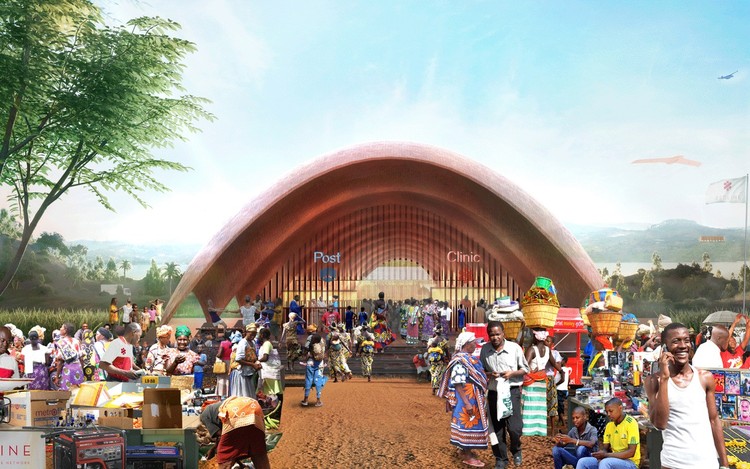
Foster + Partners has unveiled designs for a droneport in Rwanda, proposed in an attempt to bring more efficient medical care and commercial delivery services to communities in Africa where there is a lack of infrastructure required to meet the population's needs.
"Just a third of Africans live within two kilometres of an all-season road," explains the press release. "It would require unprecedented levels of investment in roads and railways to catch up with the exponential growth in Africa’s population, which is set to double to 2.2 billion by 2050." Foster + Partners instead proposes to leap that development hurdle by making use of 21st century technology - namely drones.

"Rwanda’s challenging geographical and social landscape makes it an ideal test-bed for the Droneport project," said Norman Foster. "This project can have massive impact through the century and save lives immediately."
Set to begin construction in 2016, the project is the first initiative of the Madrid-based Norman Foster Foundation, working alongside Foster + Partners, Redline - the organization that has helped to develop the drones - and the École polytechnique fédérale de Lausanne (EPFL).

The droneport includes a health clinic, a digital fabrication shop, a post and courier room, and an e-commerce trading hub, making it a key civic building in its own local area and its design allows the drones to land safely in a densely packed area. The droneport will initially focus on delivering blood and other medical supplies using drones with a 3-meter wingspan capable of carrying up to 10 kilograms, but in 2025, they plan to launch 6-meter commercial delivery drones with a payload of up to 100 kilograms - the proceeds of which will be used to subsidize the operation's medical mission.

While it may seem an outlandish, the droneport proposal is not the first suggestion that drones might be used to bypass more conventional, expensive forms of infrastructure: in July, Facebook began testing Aquila, a solar-powered drone that would deliver internet access to remote parts of the world, with Africa as one of their key targets.

The unusual brief is also not Foster + Partners' first foray into unconventional typologies: they are the designers of the world's first commercial spaceport and have also created proposals to build structures on the moon. Indeed, the firm credits their earlier work as critical in the development of the droneport, comparing the proposal to send 3D-printing robots to print a building with the moon's own soil to their current plan to send only basic formwork and brick-press machinery to the site in Rwanda and create brick vaults from local clay.

Scheduled for completion in 2020, the complex of three buildings will allow Redline's network to extend to 44% of Rwanda. Foster + Partners also suggests that subsequent phases of the project could see up to 40 buildings across Rwanda, serving not only the whole country but also neighboring countries including the Democratic Republic of the Congo.

